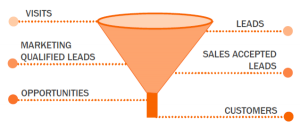
An important part of any lead generation strategy is setting and meeting goals. Lead generation tactics not based on goals cannot result in measurable success. Consequently, marketers may not know whether or not to repeat certain actions.
"68% of B2B companies are still struggling with lead generation."
Often this struggle stems from a lack of strategic planning, which includes goal creation. Team-wide goals can help marketers stay on track and better understand how to find high-quality leads.
Currently, 61% of B2B marketers find generating high-quality leads as their biggest challenge. This challenge, however, can be somewhat relieved by creating strategic goals and then identifying the tactics that will help achieve these goals.
Related Reading: 4 Common B2B Lead Generation Mistakes
One area marketers get hung up on is basing goals off of industry standards. Context is important when deciding goals, but industry standards lack that aspect. When marketers are seeking high-quality leads, the team must take a step back and ask: What is a high-quality lead?

If a marketer cannot answer that question, then the lead generation campaign is in real trouble.
By working with the sales team, marketers can better understand what a high-quality lead entails. This will take time to work through, but ultimately the campaign will benefit greatly from this knowledge. Once a marketer understands what makes someone a high-quality lead, they can derive tactics to reach this person.
Team alignment is critical:
Remember, when sales and marketing teams work together, companies see 36% higher customer retention and 38% higher sales win rates.
For many B2B industries, a high-quality lead is a very specific person. This means the number of high-quality leads might be lower per month (though sales from these leads will likely be much higher than B2C companies).
Thus, it does not make sense to base lead generation goals off of industry standards, which do not take into account information such as this.
Marketers and salespeople can work together to create a realistic goal for lead generation, which can then help gauge the success of various campaign activities.
 Marketers should pursue meaningful metrics instead of metrics that don’t mean much. Marketers should look at marketing qualified leads, conversions through the sales funnel, and sales qualified leads.
Marketers should pursue meaningful metrics instead of metrics that don’t mean much. Marketers should look at marketing qualified leads, conversions through the sales funnel, and sales qualified leads.
Of course, there will be more MQLs than SQLs, but these are great measurements to use in order to set appropriate goals for B2B lead generation campaigns.
Related Reading: HubSpot Funnel: Why It's Important for B2B Success
Measurements that have no results-driven value are metrics such as:
Marketers should stay away from using those valueless measurements as goals.
Marketers sometimes do not know or do not have access to data on campaign success.
"In fact, 25% of marketers don’t have any idea of their conversion rates."
Without those numbers, marketers are unable to justify campaign changes or continuing with a certain campaign. Not to mention, marketers have trouble justifying their value.
Marketers should have access to these data sets and analytics (as well as learn how to read these numbers) in order to set and monitor goals.
Marketers can then alter their B2B lead generation campaigns accordingly, using data-driven instead of gut-based decisions.
Sources
https://contentmarketinginstitute.com/wp-content/uploads/2015/09/2016_B2B_Report_Final.pdf
https://blog.hubspot.com/sales/stats-that-prove-the-power-of-smarketing-slideshare#sm.00000045s3peuzcsqx48tudd2v2ot
by Jonathan Franchell, CEO of Ironpaper - For more tips and hacks: Need to remove a new line after h1 tags? Both web designers and SEO practitioners need to employ headline tags: H1, H2, H3 in several ways to improve web page structure and tag...

The marketing industry is transforming significantly due to generative AI and increasing market complexity. Gartner's prediction of a 25% decline in traditional search traffic suggests that the era of search engines is dying. AI tools, particularly...

The Crowded Arena of the IT Marketplace Updated December 2024 The Information Technology (IT) landscape is experiencing rapid growth and intensifying competition. IT spending is projected to reach nearly 5.1 trillion U.S. dollars in 2024, a...

Updated December, 2024 The field of digital marketing is evolving rapidly in response to new technology and changing buyer expectations. To help career-minded marketers, we’ve rounded up the top 10 skills needed to succeed in the field. These are...
